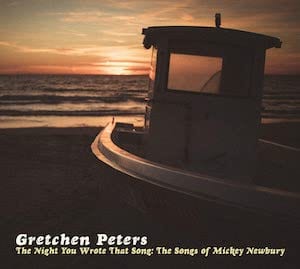
Gretchen Peters – The Night You Wrote That Song: The Songs of Mickey Newbury
Proper Records – 19 June 2020
Although many may not be familiar with Milton Sims ‘Mickey’ Newbury as an artist in his own right, they will certainly know some of his songs.
Born in Houston in 1940, Newbury moved to Nashville where he signed to Acuff-Rose as a songwriter, quickly delivering a string of hits for a diverse range of artists, the first being Don Gibson’s recording of Funny Familiar Forgotten Feelings in 1966 (a hit for Tom Jones in 1968), which doesn’t appear here, as do not Sweet Memories, Time Is A Thief or Here Comes The Rain Baby, all No 1s for, respectively, Andy Williams, Solomon Burke and Eddy Arnold. What does, however, is Just Dropped In (To See What Condition My Condition Was In), a psychedelic counter-culture Top 5 hit for The First Edition and, as such, giving Kenny Rogers his first chart success. Gretchen Peters’ version, however, adopts the slow swampy groove of Newbury’s own version, evocative of Bobby Gentry and featuring Will Kimbrough on resonator guitar and co-producer Barry Walsh on keys. Alongside them, the album also features contributions too from resident Grand Ole Opry fiddler Eamon McLoughlin, Dave Roe on bass, Neilson Hubbard on drums and harmonica from who else but Charlie McCoy who played on several of Newbury’s albums.
His songwriting success led to Newbury’s first label deal as a solo artist and, having disowned his RCA debut, Harlequin Melodies (from which comes Dropped), his breakthrough came with his 1969 concept album Looks Like Rain from which many of his greatest songs come. Gretchen Peters opts for the two best known from that album, a yearning fingerpicked take on She Even Woke Me Up To Say Goodbye and, to my mind, his finest song, San Francisco Mabel Joy. The latter is a story of a “waycrossed Georgia farmboy” who bums a train to San Francisco where he becomes a man in the arms of the title’s local hooker. He tries to find her again and winds up in jail doing time without parole after killing, one of her clients, “a merchant mad marine”, and escapes, mortally wounded, to find his way back to her as the song comes to a wry, bittersweet twist. With Dan Dugmore on pedal steel, Peters gets inside the song’s soul and stands proud alongside the original.
The song also appeared on some editions of his next album, 1971’s Frisco Mabel Joy from whence comes the magnificent slow waltzing steel-stained down, broke and alone melancholy of Frisco Depot, Buddy Miller on harmonies, though, sadly, not Remember The Good, an admittedly maudlin number covered by both Johnny Tillotson and Roy Orbison.
In 1973, he released Heaven Help The Child (including a remake of Mabel Joy). From that album comes a suitably twangsome cover of the train time boogie Why You Been Gone So Long with Walsh on a Jerry Lee piano break and he and Kim Richey on backing vocals. From that same album comes another downbeat story-song, about building bridges, not walls, Heaven Help The Child, which, with its understated arrangement, pedal steel and strings utterly eclipse the overblown original.
Moving on to 1977, Hubbard on drums and opening with backwoods scraping fiddle before the dynamic builds, the wistful Leaving Kentucky stems from Rusty Tracks, transposing the unadorned backwoods scraping fiddle from the closing of the original to the opening here, Kimbrough replacing the whistling solo with a fiery guitar break.
The following year, Newbury released His Eye Is On The Sparrow, a more, fragile and intimate recording. It’s represented here by a fuller, darker arrangement of Wish I Was and, shorn of the church bells and choirs, a restrained, world-weary yet spiritually infused piano ballad restyling of Saint Cecilia that sends shivers down the spine.
The album’s waltzing acoustic title track, a meditative road song about changing times, is another largely undiscovered Newbury classic narrative, originally appearing on 1979’s The Sailor. Paradoxically, its own title number was omitted, eventually surfacing as the opening track (as it is here) on 1981’s After All These Years, his first for Mercury and last for seven years. The original was a musically and lyrically stark, minimally arranged traditional folk-styled arrangement that showcases the tremendous power of his voice and, with its sonorous piano notes, Peters’ version, extending the number by almost two minutes, is no less haunting.
In quivering voice that recalls the McGarrigles, Gretchen Peters ends her tribute with Three Bells For Stephen, a homage to Stephen Foster from Newbury’s 1996 recording Lulled By The Moonlight, doing away with the opening tolling bells and sound of a storm, but hewing faithfully to the piano and strings arrangement as the words “Do you remember me, dear hearts and gentle people …You can buy my memories for a song” close with poignant resonance. Inducted into the Songwriters Hall of Fame in 1980, the youngest to be so honoured at that time, Newbury passed away on September 29, 2002, aged 62, after a long battle with emphysema. He only ever had one album chart in either the US Country or Billboard charts, but there have been over 1,500 recordings of his songs, even including, most recently, I Don’t Think Much About Her No More as a Vampire Weekend bonus track. A tribute to Newbury’s work has been long overdue, you could ask for no finer one than this.
Pre-Order The Night You Wrote That Song here
Photo Credit: Gina Binkley

